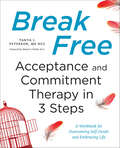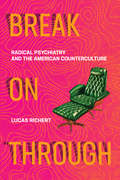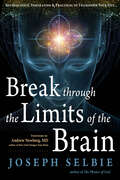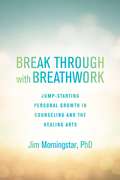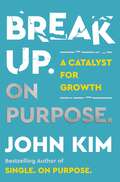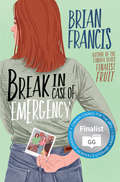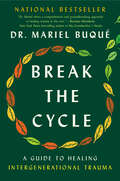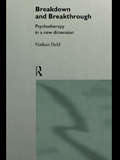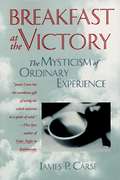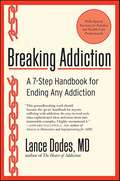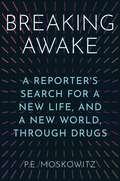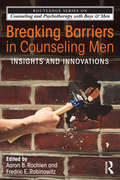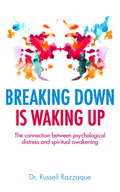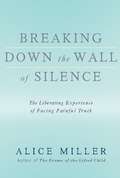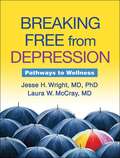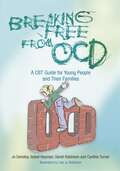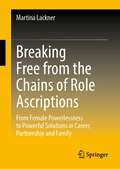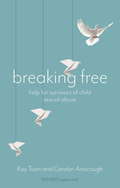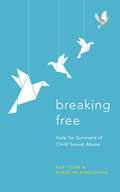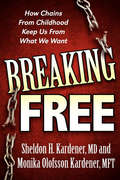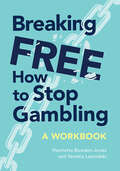- Table View
- List View
Break Free: A Workbook for Overcoming Self-Doubt and Embracing Life
by Tanya J. PetersonIf you want to do more in your life than tread water, run from problems, and just exist—let the simple, accessible tools provided in Acceptance and Commitment Therapy in 3 Steps show you how living a meaningful, purposeful life is as simple as A - C - T.I've tried self-help books, but they didn't help me feel happy… I've made progress in the past, but it didn't last… I try to get rid of the negative stuff my mind comes up with, and I'm tired of having my efforts fail… If you relate to any of these common experiences, Acceptance and Commitment Therapy, also referred to as ACT, may significantly improve the quality and direction of your life.The Mayo Clinic and National Institute of Mental Health have recognized Acceptance and Commitment Therapy as an effective mode of therapy for working through particularly stubborn or troubling emotional difficulties. Certified counselor Tanya J. Peterson applies the principles of Acceptance and Commitment Therapy with her clients who feel emotionally stuck. She has also used ACT personally to work through a personal tragedy that left her struggling with residual limitations.Acceptance and Commitment Therapy in 3 Steps: A Workbook for Overcoming Self-Doubt and Embracing Life is both a complete resource for understanding ACT and a collection of exercises to help you apply the principles of ACT in your own life. This book is an accessible, every-person's guide for building your personal set of practical ACT skills and moving towards a life lived in harmony with your personal values.ACT 101 – This easy-to-use book begins with examples of Acceptance and Commitment Therapy in practice, then pairs the main pathologies and principles into 3 steps, and finally, explores each of them in 3 step-specific chapters. The six pathologies of Acceptance and Commitment Therapy include: Fusion, Avoidance, Lost Values, Attachment to Self, Uncertain Values, and Unworkable Action.PRACTICE MAKES PROGESS – Guided writing exercise and visualizations can be done once, or multiple times as you move through various life challenges by applying Acceptance and Commitment Therapy.LIVE IN THE MOMENT – Mindfulness practice plays a big role in Acceptance and Commitment Therapy. Learn how to connect to the present moment and stay in that moment to disentangle yourself from the confusing web of thoughts and emotions, and get in touch with what's going on around you.With this accessible guide and workbook for everyday life, you will quickly and easily learn and apply ACT, without all the theoretical assumptions and jargon. By choosing Acceptance and Commitment Therapy in 3 Steps you're on the path to a mindful, high-quality life.
Break On Through: Radical Psychiatry and the American Counterculture
by Lucas Richert“Antipsychiatry,” Esalen, psychedelics, and DSM III: Radical challenges to psychiatry and the conventional treatment of mental health in the 1970s.The upheavals of the 1960s gave way to a decade of disruptions in the 1970s, and among the rattled fixtures of American society was mainstream psychiatry. A “Radical Caucus” formed within the psychiatric profession and the “antipsychiatry” movement arose. Critics charged that the mental health establishment was complicit with the military-industrial complex, patients were released from mental institutions, and powerful antipsychotic drugs became available. Meanwhile, practitioners and patients experimented with new approaches to mental health, from primal screaming and the therapeutic use of psychedelics to a new reliance on quantification. In Break on Through, Lucas Richert investigates the radical challenges to psychiatry and to the conventional treatment of mental health that emerged in the 1970s and the lessons they offer for current debates.Drawing on archives and government documents, medical journals, and interviews, and interweaving references to pop (counter)culture into his account, Richert offers fascinating stories of the decade's radical mental health practices. He discusses anti–Vietnam War activism and the new diagnosis of post–traumatic stress disorder given to some veterans; the radical psychiatrists who fought the system (and each other); the entry of New Age–style therapies, including Esalen's Human Potential Movement, into the laissez-faire therapeutic marketplace of the 1970s; the development of DSM III; and the use of LSD, cannabis, and MDMA. Many of these issues have resonance today. Debates over medical marijuana and microdoses of psychedelics echo debates of the 1970s. With rising rates of such disorders as anxiety and depression, practitioners and patients continue to search for therapeutic breakthroughs.
Break Through the Limits of the Brain: Experience Superconscious Awareness, Intuition, Vitality, Creativity, and Fulfilling Divine Joy
by Joseph SelbieA life-changing guide to understanding your brain and how to change it—for good. Break Through the Limits of the Brain explores the neuroscience of sacred, superconscious experience. It offers proven ways to break through the brain's limits into a life-changing, life-enhancing awareness that is beyond our everyday consciousness; an awareness that is intuitive, creative, energized, joyful, and spirit-filled. Selbie explains how and why the brain's neural circuits reinforce thoughts, emotions, and behaviors that keep us immersed in limited conscious awareness—and how radical neuroplasticity enables our innate ability to rewire the brain to break through to unlimited superconscious awareness. The book offers many practices: the Hong Sau technique of meditation for deepening concentration, energization exercises for increasing life-force and vitality, methodical introspection techniques for identifying neurally reinforced negative patterns of thought, emotion, and behavior and affirmations for directly rewiring them. These practices will help you bring superconscious awareness into your life that enables, awakens, and supports success, vitality, creativity, health, peace of mind, and lasting, fulfilling happiness. Break Through the Limits of the Brain provides strong scientific support for superconscious awareness; scientific support provided by quantum physics and M-theory for the existence of a subtle, nonlocal reality; a reality in which we exist simultaneously with physical reality; a reality of which we can become aware by breaking through the limits of the brain. The book debunks scientific materialism's brain-based explanation for consciousness and intelligence—the brain-as-supercomputer model—and explains the view of many prominent and open-minded scientists that an all-pervading intelligent consciousness is not only the source of our own consciousness but also the foundation of reality—an age-old sacred belief shared by saints, sages, mystics, and those who've had near-death experiences. Meditation is a central theme of the book—what it is; how to do it; why it works; its physical, mental, and emotional benefits as measured by neuroscientists; and how it rewires the brain for us to experience superconscious awareness and to achieve whatever we put our mind to.
Break Through with Breathwork: Jump-Starting Personal Growth in Counseling and the Healing Arts
by Jim MorningstarWhen working with trauma and chronic health issues, it can often seem like the healing process gets stuck or is producing only minimal progress. In this groundbreaking book, clinical psychologist Jim Morningstar, PhD, shows therapists, bodyworkers, and other health care professionals how to achieve remarkable breakthroughs with their clients using the power of Therapeutic Breathwork. Unlike more commonly known mindfulness breathwork techniques—which typically only involve slower-than-normal breathing—Therapeutic Breathwork is designed to also include faster-than-normal breathing (35–75 breaths per minute) to enervate the sympathetic nervous system. This is especially useful in helping to release blocks that arise while working through difficult emotional issues, including PTSD, addiction, depression, and anxiety. While traditional talk therapy can take many years, sometimes decades, to produce minimal relief, Therapeutic Breathwork can help facilitate astonishing breakthroughs within a single session. Morningstar explains how therapists can reinforce these breakthroughs with additional techniques for self regulation, dramatically reducing recovery time and often resolving challenges that might never have been worked through in standard practice. Break Through with Breathwork is an accessible and thorough introduction to one of the most powerful tools in supporting health and wellbeing, reducing stress, and stimulating deep emotional and spiritual growth.
Break Up On Purpose: A Catalyst for Growth
by John KimAn honest guide to breaking up and breaking through from the bestselling author of Single on Purpose, John Kim.Every breakup is painful. Yet it is also a transformation. A breaking down and breaking through to a new version of who you are now, after you have severed ties. Nothing will change you like a broken heart. Yet every breakup is different.John Kim, The Angry Therapist, has guided thousands of patients through breakups of every brutal, freeing, heartbreaking kind—and he’s lived through failed relationships and a divorce of his own. Through his journey as a therapist and as a partner and father, John has identified eight types of unique breakups—and can help anyone get through them:The Big One Break-Up (the One you Compare All To)The Blindsided Break-UpThe “Flat Soda” (Mutual) Break-UpThe You Cheated/You Left Me for Someone Else Break-UpThe Soap Opera Break-UpThe Almost-Relationship BreakupThe Break Up That Never EndsThe D-word (Divorce)Each type elicits different responses and requires different approaches to healing and starting over. Utilizing his signature “self-help in a shot glass” approach, Break Up on Purpose is a three-part guide to healing from heartbreak. You’ll find stories from John and his patients documenting every type of breakups, discover honest reflections about what really went down, and engage in Break Through Work to master the steps necessary to truly heal and grow.Break Up on Purpose shows us how a breakup can be the ultimate tool for personal growth, where we discover bodies rewired, trauma processed, false beliefs dissolved, and new standards set.
Break in Case of Emergency: A Novel
by Brian FrancisDads can be such a dragLife has been a struggle for Toby Goodman. Her mother died by suicide five years ago, and her father left their small town before Toby was born. Now a teenager living on her grandparents’ dairy farm, Toby has trouble letting people in. She keeps even her closest friend, the brash but endearing Trisha, at arms’ length, and recently ended her first relationship, with Trisha’s burnout brother, Mike. Convinced that she is destined to follow her mother’s path, Toby creates a plan to escape her pain.But with the news that her father is coming home and finally wants to meet her, Toby must face the truth of her family’s story. Not only is her father gay, but he’s also a world-famous female impersonator—and a self-absorbed, temperamental man-child who is ill-prepared to be a real parent. When Toby’s careful plans go awry, she is forced to rebuild the life she thought she knew from the ground up. While she may not follow an expected path, through the support of a quirky but lovable circle of friends and family, Toby may finally put together the many different pieces that make up her past, her present, and her future.
Break the Cycle: A Guide to Healing Intergenerational Trauma
by Dr. Mariel BuquéA Next Big Idea Club must-read title for January 2024The definitive, paradigm-shifting guide to healing intergenerational trauma—weaving together scientific research with practical exercises and stories from the therapy room—from Dr. Mariel Buqué, PhD, a Columbia University–trained trauma-informed psychologist and practitioner of holistic healingFrom Dr. Mariel Buqué, a leading trauma psychologist, comes this groundbreaking guide to transforming intergenerational pain into intergenerational abundance. With Break the Cycle, she delivers the definitive guide to healing inherited trauma. Weaving together scientific research with practical exercises and stories from the therapy room, Dr. Buqué teaches readers how trauma is transmitted from one generation to the next and how they can break the cycle through tangible therapeutic practices, learning to pass down strength instead of pain to future generations. When a physical wound is left unhealed, it continues to cause pain and can infect the whole body. When emotions are left unhealed, they similarly cause harm that spreads to other parts of our lives, hurting our family, friends, community members, and others. Eventually, this hurt can injure an entire lineage, metastasizing across years and generations. This is intergenerational trauma. This trauma is why some of us become estranged from our families, why some of us are people pleasers, why some of us find ourselves in codependent relationships. This trauma can be rooted in the experiences of ancestors, who may have suffered due to unhealthy family dynamics, and it can be collective, the result of a shared experience like systemic oppression, or harmful ingrained behaviors in a culture like the acceptance of physical discipline of children, or even a natural disaster like a pandemic. These wounds are complex, impacting our minds, bodies, and spirits. Healing requires a holistic approach that has so far been absent from the field of psychology. Until now.
Breakdown and Breakthrough: Psychotherapy in a New Dimension
by Nathan FieldBreakdown and Breakthrough examines the essential role of regression in the patient's recovery from mental illness. In light of this Nathan Field reassesses the role of the therapist tracing psychotherapy back to its earliest spiritual roots and comparing modern analytic methods with ancient practices of healing and exorcism. The author uses vivid examples from his psychotherapeutic practice to show how, with the apparent breakdown of the therapeutic method itself, patients can break through to a new level of functioning. The book goes on to consider how psychotherapy has been affected by fundamental developments in twentieth century science, such as the move from old, classical assumptions of linear causation to non-linear complexity from reductionism to a holistic systems approach and from mental mechanisms to acknowledging the mysteries of unconscious interaction. Taking up the radical vision originally proposed by Carl Jung and later fostered by eminent psychotherapists such as Winnicott and Bion, the author shows how psychotherapy can be reframed to admit the existence of a psychological fourth dimension. Nathan Field reappraises ideas of health and pathology, psychoanalysis and healing, sex and spirituality in light of a dramatic shift in the way we understand ourselves. How this shift alters the shape of psychotherapy in the twenty-first century is the challenge the practitioners, teachers and trainees must all address.
Breakfast at the Victory: The Mysticism of Ordinary Experience
by James P. Carse"This was true mystical vision. This I could never have anticipated. But I knew that we were both on the same galactic journey into the great void that contains us all. I was standing before a boundlessness that could swallow the stars in a heartbeat."--from Breakfast at the Victory
Breaking Addiction: A 7-Step Handbook for Ending Any Addiction
by Lance Dodes“Dr. Dodes’s approach runs directly counter to the paralyzing, but standard, message of ‘powerlessness’—a message that reinforces the sense of helplessness that is at the root of addicts’ life predicaments! Many psychiatrists recognize that this is where we must head, but Dr. Dodes is one with the guts to shine a beacon in the right direction.”—Stanton Peele, PhD, author of 7 Tools to Beat Addiction and The Life Process Program of TreatmentThe follow-up to his groundbreaking volume The Heart of Addiction, Dr. Lance Dodes’s Breaking Addiction is a step-by-step guide to beating addiction of any kind—from drugs and gambling to alcoholism, overeating, and sex addiction. By recognizing and understanding the emotional forces underlying addictive behaviors, Dr. Dodes says any dangerous, life-destroying obsession can be overcome. Including special bonus sections for both families and health-care professionals, Breaking Addiction is the new handbook for those suffering from addiction—a valuable resource that addresses addiction’s root causes and serves as an alternative to Alcoholics Anonymous and similar recovery programs.
Breaking Awake: A Reporter's Search for a New Life, and a New World, Through Drugs
by P.E. MoskowitzFrom the &“talented and impassioned writer&” (San Francisco Chronicle) of How to Kill a City, a riveting journey that combines Drug Use for Grown-Ups with How to Do Nothing, as it explores our national mental health and drug use crises while also searching for answers as to how we can find a path to collective healing.Why are so many of us unhappy, anxious, and without purpose? And how can we get better? Several years ago, P.E. Moskowitz had a near-death experience, followed by a nervous breakdown. As they willed themselves back to life using a variety of drugs, both prescription and illicit, they started to wonder: Why are so many of us seeking out these types of interventions to deal with our daily reality? In Breaking Awake, Moskowitz takes us on a kaleidoscopic voyage through our country&’s collective mental health collapse, and the drugs we take—from fentanyl to SSRIs, to ketamine to LSD and beyond—to cope with the gnawing bleakness of our present moment. In a cross-country tour of drug use—including the free heroin handed out on the streets of Vancouver, a mom in Chicago who has been on SSRIs since childhood and now can&’t live without them, and ravers in Brooklyn taking drugs most people have never heard of to push the limits of human consciousness—Moskowitz questions whether drugs can spark liberation or simply quell the pain of modern life. Is it time to view drugs differently? And can drugs help us envision a better future?
Breaking Barriers in Counseling Men: Insights and Innovations (The Routledge Series on Counseling and Psychotherapy with Boys and Men)
by Aaron B. Rochlen Fredric E. RabinowitzBreaking Barriers in Counseling Men is a unique collection of personal and engaging contributions from nationally recognized scholars and clinicians with expertise in treating men. The editors have selected men’s clinicians who address areas as diverse as sexual dysfunction, male bonding over sports, father-son relationships, and counseling men in the military. Featuring a mix of clinical tips, personal anecdotes, and theoretical reframing, this book takes clinicians invested in these issues to the next level, breaking down barriers to connecting with men and getting them the help that is so often needed.
Breaking Down is Waking up
by Russell RazzaqueRazzaque explores an entirely new way of understanding psychological and mental distress based on clinical case studies from a mental hospital. His extraordinary conclusion: mental illness can be a form of spiritual awakening. The book describes new forms of treatment for mental illness inspired by Eastern approaches and centering, in particular, around practices such as mindfulness and meditation. These therapies offer both patients and their families the inspiring idea that the approach to their psychological difficulties should go beyond just "treating" episodes of mental illness but also, where possible, help the individual to complete the process of spiritual growth they have begun. Dr Razzaque argues passionately that our society as a whole could benefit from developing an awareness of the spiritual power of this process of transformation.Written in the tradition of the bestselling medical doctors, Stanford's Irvin D. Yalom and Britain's Oliver Sacks, Breaking Down is Waking Up, will speak to both professionals in the field of mental health as well as those suffering from mental illness, their family and friends and, indeed, all those who have an interest in exploring the deepest layers of what it really means to be human.
Breaking Down is Waking up
by Russell RazzaqueRazzaque explores an entirely new way of understanding psychological and mental distress based on clinical case studies from a mental hospital. His extraordinary conclusion: mental illness can be a form of spiritual awakening. The book describes new forms of treatment for mental illness inspired by Eastern approaches and centering, in particular, around practices such as mindfulness and meditation. These therapies offer both patients and their families the inspiring idea that the approach to their psychological difficulties should go beyond just "treating" episodes of mental illness but also, where possible, help the individual to complete the process of spiritual growth they have begun. Dr Razzaque argues passionately that our society as a whole could benefit from developing an awareness of the spiritual power of this process of transformation.Written in the tradition of the bestselling medical doctors, Stanford's Irvin D. Yalom and Britain's Oliver Sacks, Breaking Down is Waking Up, will speak to both professionals in the field of mental health as well as those suffering from mental illness, their family and friends and, indeed, all those who have an interest in exploring the deepest layers of what it really means to be human.
Breaking Down is Waking up
by Russell RazzaqueRazzaque explores an entirely new way of understanding psychological and mental distress based on clinical case studies from a mental hospital. His extraordinary conclusion: mental illness can be a form of spiritual awakening. The book describes new forms of treatment for mental illness inspired by Eastern approaches and centering, in particular, around practices such as mindfulness and meditation. These therapies offer both patients and their families the inspiring idea that the approach to their psychological difficulties should go beyond just "treating" episodes of mental illness but also, where possible, help the individual to complete the process of spiritual growth they have begun. Dr Razzaque argues passionately that our society as a whole could benefit from developing an awareness of the spiritual power of this process of transformation.Written in the tradition of the bestselling medical doctors, Stanford's Irvin D. Yalom and Britain's Oliver Sacks, Breaking Down is Waking Up, will speak to both professionals in the field of mental health as well as those suffering from mental illness, their family and friends and, indeed, all those who have an interest in exploring the deepest layers of what it really means to be human.
Breaking Down the Wall of Silence
by Alice MillerMiller incorporates psychohistorical analyses of Hitler, Stalin, and Ceausescu to reveal the links between the horrors of their childhoods and the horrors they inflicted on the world. She pleads for an awareness of society's role in child abuse and for recognition of the victim.
Breaking Free from Depression
by Jesse H. Wright Jesse W. MccrayWhen it comes to treating depression, one size definitely doesn't fit all. How do you find the science-based treatment that will work for you? What can you do to restore the fighting spirit and motivation that are so essential for overcoming this illness? Leading psychiatrist-researcher Jesse Wright and his daughter, Laura McCray, a family physician, have helped many thousands of depressed patients discover effective pathways to wellness. Here they describe powerful treatment tools and present a flexible menu of self-help strategies you can try today or turn to in the future. Dozens of easy-to-use worksheets and forms are included for you to complete in the book or download and print from the companion Web page. Learn proven ways to break the cycle of negative thinking, restore energy and a sense of well-being, strengthen your relationships, and make informed decisions about medications. You can beat depression and keep your life headed in a positive direction. This book shows how.
Breaking Free from OCD: A CBT Guide for Young People and Their Families
by Sarah Robinson Isobel Heyman Cynthia Turner Jo DerisleyPart of the Reading Well scheme. 35 books selected by young people and health professionals to provide 13 to 18 year olds with high-quality support, information and advice about common mental health issues and related conditions. Obsessive-compulsive disorder (OCD) is a potentially life-long debilitating disorder, which often emerges during teenage years and affects as many as 1 in every 50 people. Young people living with OCD experience recurrent obsessions or compulsions that are distressing and interfere with their social lives, relationships, educational functioning and careers. Written by leading experts on OCD, this step-by-step guide is written for adolescents with OCD and their families, to be used in home treatment or as a self-help book. Using the principles of cognitive behavioural therapy (CBT), which is the proven method for helping those with OCD, it offers teenagers a structured plan of treatment which can be read alone, or with a parent, counsellor or mental health worker. The guide provides useful advice and worksheets throughout. This self-help book for young people is an invaluable resource for adolescents who have suffered from, or know someone who has suffered from, OCD, their families, teachers, carers, and mental health professionals.
Breaking Free from the Chains of Role Ascriptions: From Female Powerlessness to Powerful Solutions in Career, Partnership and Family
by Martina LacknerThis book is no standard guide on ordinary women’s topics. It relentlessly reflects on what slows down women's personal development regarding relationship, family and work - with razor-sharp analyses of hidden interactions and traumas. This book enables women to become aware of existing traps and obstacles, fears, feelings of guilt and other deep-seated emotions to help them leave behind restricting role attributions while power-balancing their lives between partner, children and career.Women often consider themselves as the patriarchy’s victims. Instead, the author identifies the fact that they lack awareness of their own power and the willingness to recognize it, the fact that women often neither admit nor accept their own power, as the prime reason why women remain stuck in traditional role models – for equality would require their powerful sovereignty. This book offers solutions to seemingly difficult situations, and experienced women leaders have their say. The recommendations on how to set a decisive course on the path to female empowerment leave readers with no room to retreat and hide behind familiar and often practiced counterarguments: This book encourages self-reflection as well as public discussion.The translation was done with the help of artificial intelligence. A subsequent human revision was done primarily in terms of content.
Breaking Free: Help For Survivors Of Child Sexual Abuse
by Kay Toon Carolyn AinscoughThis classic book has helped many thousands of people to manage the impact that childhood sexual abuse has had on their lives. The positive and optimistic approach continues to empower survivors to break free from the past. This new edition by clinical psychologist Kay Toon now refers to types of abuse that have come to light more recently, such as street exploitation, and abuse by celebrities, politicians and football coaches, as well as the use of digital technology to groom children and young people. Breaking Free is regularly recommended by agony aunts and therapists. A Department of Health project provided copies of Breaking Free and the Breaking Free Workbook to NHS Mental Health Provider Trusts.‘The voice of the cowed, betrayed and helpless sexually abused child speaks powerfully throughout this book.’ British Journal of Psychiatry‘The way the book instils hope is inspiring’Journal of Social Work Practice‘This book will be enormously helpful to those who have endured sexual abuse.’Nursing Times
Breaking Free: Help For Survivors Of Child Sexual Abuse
by Kay Toon Carolyn AinscoughThis classic book has helped many thousands of people to manage the impact that childhood sexual abuse has had on their lives. The positive and optimistic approach continues to empower survivors to break free from the past. This new edition by clinical psychologist Kay Toon now refers to types of abuse that have come to light more recently, such as street exploitation, and abuse by celebrities, politicians and football coaches, as well as the use of digital technology to groom children and young people. Breaking Free is regularly recommended by agony aunts and therapists. A Department of Health project provided copies of Breaking Free and the Breaking Free Workbook to NHS Mental Health Provider Trusts.‘The voice of the cowed, betrayed and helpless sexually abused child speaks powerfully throughout this book.’ British Journal of Psychiatry‘The way the book instils hope is inspiring’Journal of Social Work Practice‘This book will be enormously helpful to those who have endured sexual abuse.’Nursing Times
Breaking Free: Help For Survivors Of Child Sexual Abuse
by Kay Toon Carolyn Ainscough'This book will be enormously helpful to those who have endured sexual abuse' Nursing TimesThis classic book has helped many thousands of people to manage the impact that childhood sexual abuse has had on their lives. The positive and optimistic approach continues to empower survivors to break free from the past.Now with signficantly updated resource and further help sections, this latest edition by clinical psychologist Kay Toon acknowledges the types of abuse that have come to light more recently, such as street exploitation, and abuse by celebrities, politicians and football coaches, as well as the use of digital technology to groom children and young people.Breaking Free is regularly recommended by counsellors, by media agony aunts and psychotherapists. A Department of Health project provided copies of Breaking Free and the Breaking Free Workbook to NHS Mental Health Provider Trusts. It is ideal both for those seeking therapeutic support and for those providing such support.'The voice of the cowed, betrayed and helpless sexually abused child speaks powerfully throughout this book.'British Journal of Psychiatry'The way the book instils hope is inspiring'Journal of Social Work Practice
Breaking Free: Help For Survivors Of Child Sexual Abuse
by Kay Toon Carolyn Ainscough'This book will be enormously helpful to those who have endured sexual abuse' Nursing TimesThis classic book has helped many thousands of people to manage the impact that childhood sexual abuse has had on their lives. The positive and optimistic approach continues to empower survivors to break free from the past.Now with signficantly updated resource and further help sections, this latest edition by clinical psychologist Kay Toon acknowledges the types of abuse that have come to light more recently, such as street exploitation, and abuse by celebrities, politicians and football coaches, as well as the use of digital technology to groom children and young people.Breaking Free is regularly recommended by counsellors, by media agony aunts and psychotherapists. A Department of Health project provided copies of Breaking Free and the Breaking Free Workbook to NHS Mental Health Provider Trusts. It is ideal both for those seeking therapeutic support and for those providing such support.'The voice of the cowed, betrayed and helpless sexually abused child speaks powerfully throughout this book.'British Journal of Psychiatry'The way the book instils hope is inspiring'Journal of Social Work Practice
Breaking Free: How Chains From Childhood Keep Us From What We Want
by Sheldon H. Kardener Monika Olofsson KardenerThese are some of the issues addressed by the Kardeners in Breaking Free: How Chains From Childhood Keep Us From What We Want. Why do our best intentions so often go awry? What prompts people to engage in behaviors that have the opposite outcome from what they wished to have happened? What attracts us to our mates and then alienates us from them—only to find similar difficulties in subsequent relationships? How and why do we get in our own way of success? What contributes to distress within a person, between people, communities and nations?
Breaking Free: How To Stop Gambling
by Neil Smith Bowden-Jones, Henrietta OBE Venetia LeonidakiHave you ever lied about your gambling habits to anyone, or tried to conceal the fact you've gambled? Have you ever bet more than you could afford to lose, or gone back the next day to try and win back the money you've lost? Your gambling may be becoming problematic and it's time to seek help. Breaking Free: How to Stop Gambling is a self-help workbook, packed full of practical exercises, worksheets and questionnaires, designed to help you assess the extent of your gambling problem, and develop strategies to combat it. The materials use a cognitive behavioural therapy (CBT) approach to guide you through practical steps and techniques that can help you take back control of your habit. All of the materials have been developed by leading experts in the field and are evidence-based interventions, and are designed to help you to break free from your gambling problem.
